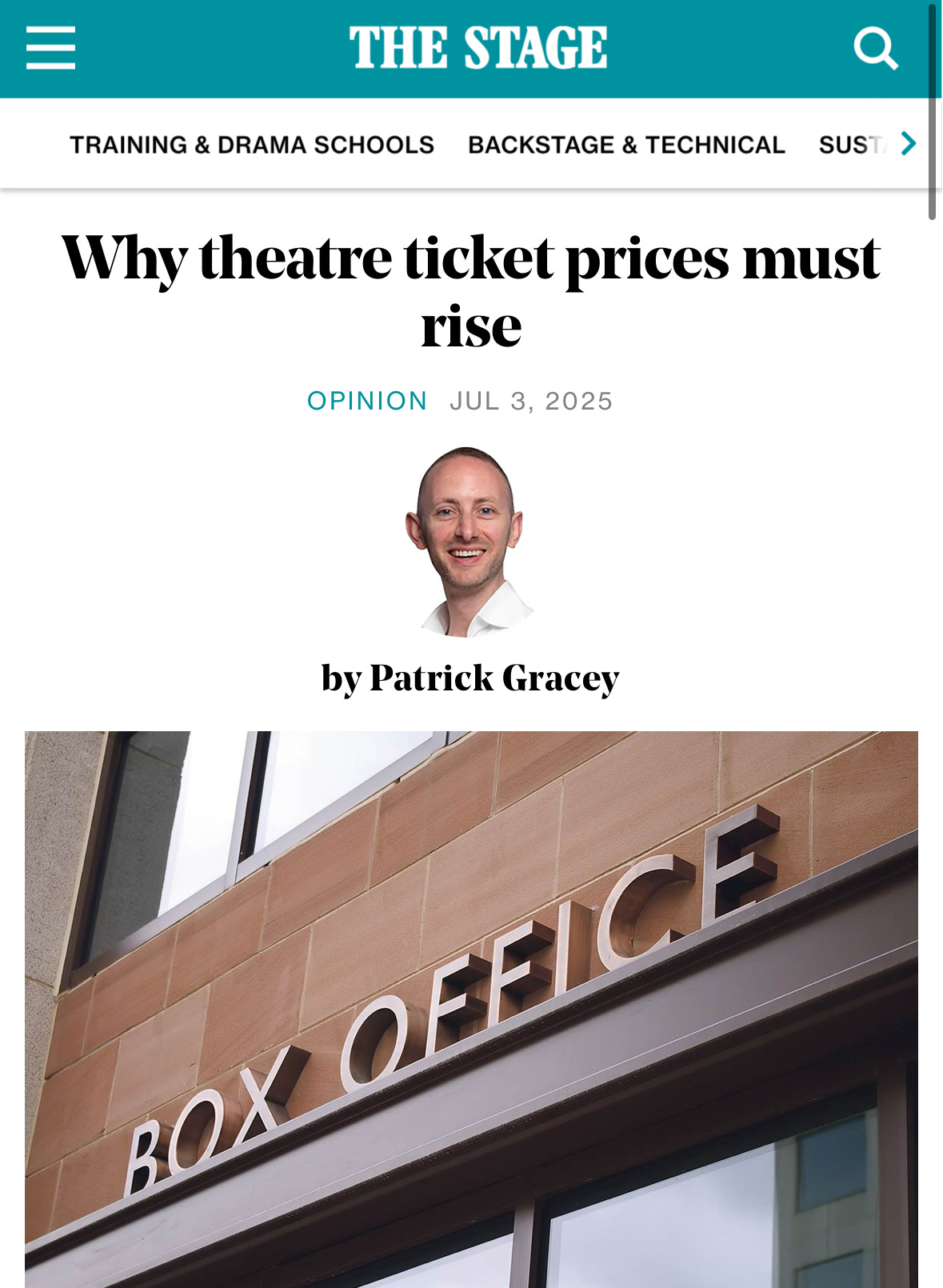The topsy turvy economics of West End theatre tickets
Industry leaders say prices are ‘misrepresented’ 👀
WELL, London Theatre has served up another week of perfectly (and brazenly) packaged PR.
Like Andrew Lloyd Webber’s Starlight Express, but for Avanti passengers.
Leave it to SOLT (Society of London Theatre) to come up with the only thing more awful than West End Live - wheeling out their third press release in a week, they hit back at criticism of ticket prices and claimed that only one in every 400 tickets is sold for more than £250.
By way of recap, this was in response to a survey revealing that top ticket prices for West End shows have increased by 5% year on year, while the lowest-priced tickets surged by 24%.
I’ve spent the morning crunching the numbers for five of the biggest musicals and plays in town. I can tell you it’s exasperating.
Transaction fees, restoration levies, priority boarding, packages, lotteries, TodayTix and Day Seats make trying to work out average tickets a totally futile exercise.
It’s almost as if it is all so deeply unregulated and murky so that people can capitalise and make as much money as possible. Without scrutiny.
Here’s why. Take Giant. The Olivier award-winning play is excellent, but there are now standing tickets currently on sale in two tiers for £15 and £25. Would you pay to stand at the back of the cramped upper circle of the Harold Pinter Theatre (hotter than Greece) for 3 hours?
Insanely, there are also plenty of £424 tickets available via Today Tix. Who is regulating this? Where is this money going?
The answer is nobody wants us to know.
Patrick Gracey, a theatre producer who is often put out to defend stupid prices and, of course, a board member of SOLT, wrote in The Stage that producers needed the flexibility to vary prices — and have higher ones at peak times for popular shows — in order to reinvest in the industry and to provide a “range of affordable [ticket] options”.
Gracey says that ticket prices must rise. He proposes raising the face value of a limited number of top-price tickets to secure fair pay for creatives, while protecting affordable pricing at the lower end.
Anyway, across the pond, Australia is cracking down on dynamic pricing and hidden fees in concerts and cultural events. If they can do it why can’t we?
This really is one of those issues where there’s a passionate reaction from the public that something is beyond the pale.
Meanwhile, this week, the UK competition watchdog wrote to Ticketmaster threatening legal action over the way it sold more than 900,000 tickets for Oasis’s reunion tour.
In the end, though, and on the basis of all the above and so, so much more … I am, as ever, very much for a more joined-up, consistent and fair West End.
Against this backdrop, inflation and an excruciating cost of living crisis, we know that adults from working-class backgrounds are four times less likely to work in the creative industries compared to their middle-class peers.
It is incumbent on all of us to keep a close eye on what happens to entry-level prices: too much harm is already being done to theatre fans who paid over the odds last year.
In other words, reaching a solution isn’t straightforward. However, acknowledging the need for a conversation about the unregulated secondary market, the fact that a prominent theatre owner runs a ticketing arm, the involvement of a leading west end producer in an investment bank, and the exclusion of working-class and middle-class communities would be a positive step. It is urgent. And I won’t shut up about it.








Another great piece. "We must increase prices in order to make tickets more affordable" says the Party of Producers.
There are several steps that Producers could take to be more transparent starting with publishing grosses as is the practise on Broadway. What do they have to hide?
We went to see Evita last Friday (which was spectacular). We bought our tickets when they first became available and paid £92.50 for front row seats in the dress circle. We checked back the day before to see what seats were available and found three seats, two rows back from ours priced at £320 each. Clearly there is demand for the show which is driving prices but, to your point, this is not obvious anywhere during the booking process - and nor is there any apparent upper limit on where these prices may arrive.
SOLT is also an interesting case because they represent the Producers rather than performers, creatives, technicians or audiences. On their TKTS website they lead with a 'prices from' promo that, when you click through, no longer exists, if it ever did.
West End Theatre is a business that is in danger of leaving its audience behind or maybe some Producers have decided to only chase the wealthy. As Ms Peron might have said "Don't forget the power of the descamisados" because when you come to sell the 20th even more cut price national tour of your previous London show you might find they have all forgotten who you are.
I’m interested that West End producers are so sensitive about criticism of their high prices, and still pay lip service to the notion of ‘affordable’ prices. These are commercial companies working in a commercial, albeit risky, industry. There is a finite number of seats, so If they have a hit on their hands, I’m not entirely sure why they shouldn’t charge whatever price they can.
Maybe we should accept that a star name in a West End show is for an elite.
For the vast majority of less well off theatre lovers or those new to theatre, there are many theatres outside the West End (some but not all subsidised) that provide ‘affordable’ prices for excellent shows.
I agree that some transparency wouldn’t go amiss. I recall that the problem with Oasis was that prices went up while people were in the process of buying their tickets. Tickets prices, whether sold by the theatre or an agency, should be clear and fixed once the customer has begun their purchase. All extras like booking fees, restoration fees, etc should be included from the start. However, to stop a commercial company raising prices if demand is high- and lowering them if the opposite is the case- would be an interference with the free market.
I admire those companies who price tickets based on production cost rather than greed (step forward, David Pugh) or adopt a policy of providing a certain number of low priced ‘good’ seats to encourage the young or less well off, but I don’t think they’re under any obligation.